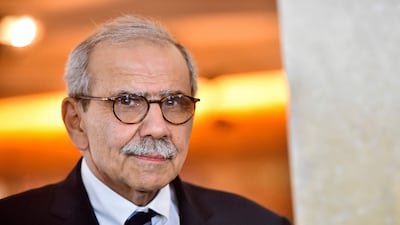Lebanon's Prime Minister-designate Nawaf Salam began non-binding parliamentary consultations on Wednesday to form his government, in discussions pivotal to the country's way forward.
The talks are a preliminary step towards the establishment of an administration capable of addressing the challenges facing Lebanon, including economic recovery, political stability and rebuilding efforts after the devastating war between Israel and the Iran-backed militant group Hezbollah.
Hezbollah and its Shiite ally, the Amal Movement, have chosen not to participate in the consultations, according to local media.
Parliamentary Speaker Nabih Berri, who leads the Amal Movement, has boycotted the talks and did not attend a scheduled meeting with Mr Salam on Wednesday morning.
Mr Salam, a diplomat and jurist, served as Lebanon's ambassador to the UN from 2007 to 2017 and was president of the International Court of Justice from February last year until his resignation on Wednesday, following his nomination as prime minister.
His appointment comes after Hezbollah's 14-month war with Israel, which killed about 4,000 people and resulted in significant economic and infrastructure damage.
The new leadership, including President Joseph Aoun, who was elected by parliament last week, is seen as a hopeful step towards recovery and reconstruction. Both Mr Aoun and Mr Salam are perceived as newcomers who represent a break from the traditional political system.

Mr Salam's nomination won support from opposition groups in the Lebanese parliament. However, it faced criticism from Hezbollah and the Amal Movement, which hold all the seats reserved for Shiite Muslims in the legislature. Hezbollah accused its opponents of seeking to exclude them.
The absence of support from any Shiite MP leaves the new government vulnerable to accusations of breaching Lebanon’s National Pact, a power-sharing arrangement that aims to ensure inclusivity and safeguard the rights of the country’s diverse religious sects.
Selecting a cabinet will be a challenging task for Mr Salam, like other prime ministers before him. The process can take many days, weeks or even months as political parties vie for representation at the ministerial level.
Mr Salam said he is committed to uniting all political factions to "rescue, reform and rebuild" Lebanon. He pledged to extend the authority of the Lebanese state across its entire territory, aligning with the full implementation of UN Resolution 1701.
"We hope that the future government will be small and composed of women and new faces, without quotas," said MP Mark Daou after a meeting between the prime minister-designate and MPs from the Change Alliance, a group of politicians who emerged after the 2019 protests against Lebanon's ruling elite.


